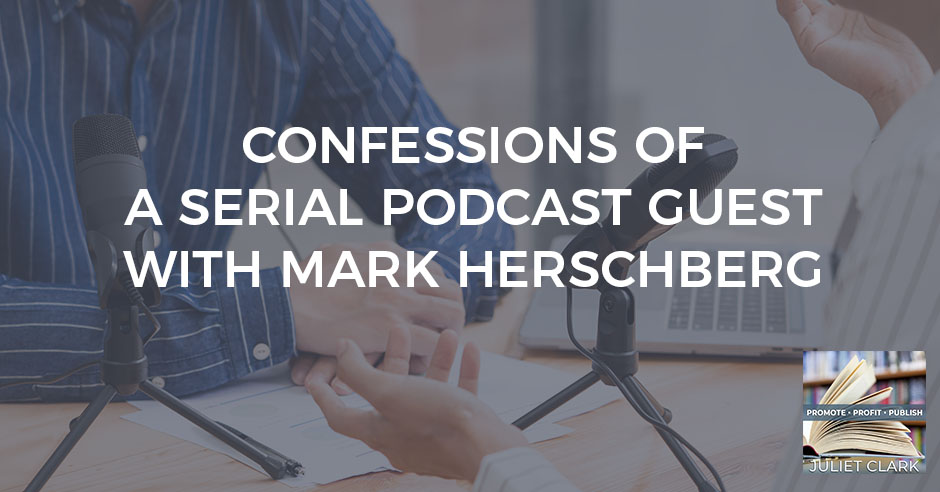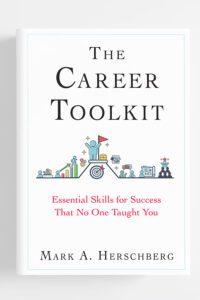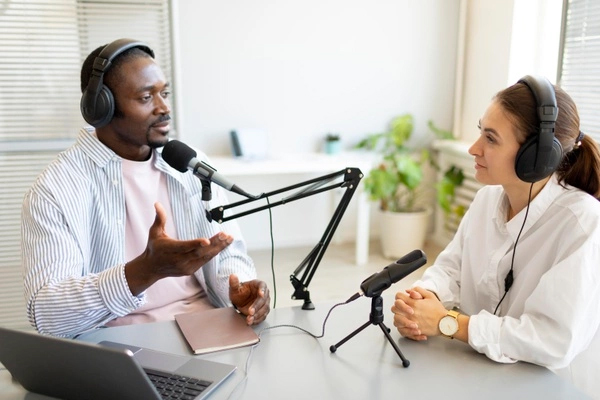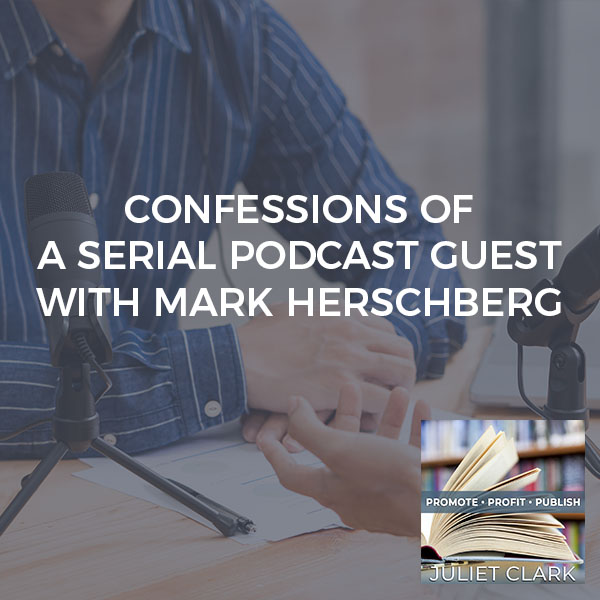
Podcasting is a great way to promote and get your name out there. But how does one become a serial podcast guest? In this episode, serial podcaster Mark Herschberg is here to share secrets of the trade! Mark is the author of The Career Toolkit. He made a goal to guest on 150 podcasts to promote his book. Now, he’s been in 200 recorded podcasts, with 160 or so live and some 50 more in the queue. Tune in as he chats with host Juliet Clark about how he managed to surpass his podcast guesting goal and how you can do the same!
—
Watch the episode here
Listen to the podcast here
Confessions Of A Serial Podcast Guest With Mark Herschberg
We have a serial podcaster on. I hope you will enjoy this. You might learn something, too. Before we start, and I introduce Herschberg to you, I want to remind you to go over to www.PromoteProfitPublishQuiz.com. Find out if you are ready to publish or have some areas you need to spruce up before you jump in and bring your content out to the world. Also, don’t forget to go over to Superbrand Publishing, our YouTube channel. Go over there and subscribe.
Our guest is Mark Herschberg. From tracking criminals and terrorists on the dark web to creating marketplaces and new authentication systems, Mark has spent his career launching and developing new ventures at startups, Fortune 500s, and academia. He helped start the Undergraduate Practice Opportunities Program dubbed MIT’s career success accelerator, where he teaches annually. At MIT, he received a BS in Physics, Electrical Engineering, and Computer Science and a Master’s in Electrical Engineering and Computer Science, focusing on cryptography.
At Harvard Business School, Mark helped create a platform used to teach finance at prominent business schools. He also works with many nonprofits, including Techie Youth and Plant A Million Corals. He is one of the top-ranked ballroom dancers in the country and lives in New York City, next to an apartment that’s being renovated. He’s also known for his social gatherings, including his annual Halloween party and diverse cufflink collection. You sound interesting. Welcome, Mark.

The Career Toolkit: Essential Skills for Success That No One Taught You
Thanks for having me on the show. I’m excited to be here.
Tell me about the Halloween party. That’s one of my favorite holidays.
I, unfortunately, missed it in 2020 and 2021 but I have been doing Halloween parties for decades. I require everyone to dress up. We do a costume contest at midnight. Despite having a one-bedroom in New York City, I have a few boxes full of Halloween supplies. I’m giving up some of my minimal closet space to store Halloween decorations so I can have a well-decorated Halloween party every year.
I’m talking to you because you came to my attention through Tracy Hazzard as a serial podcast guest. You have so much to add to our audience here. First of all, tell us about the book and why you wrote it.
I have been teaching at the career success accelerator at MIT for many years. These are the skills that we know help someone become successful. After teaching for years, I said, “We need to expand this to other people. These skills are not just for MIT students,” but we never had time to do that. I thought I would write up some notes for the class that would help the students, it’s a very interactive class, and they don’t take notes and maybe share them online. Twenty pages of writing quickly became 40 to 80. Once it passed 100, I said, “I have a book here.” I reached out to my friend, Dorie Clark, a bestselling business author, got a lot of advice from her, decided to go forward and create the book.
I interviewed her on Ask Juliet. She was one of my first interviews back in 2015. That’s good for you to reach out and get her help. She doesn’t live in the apartment next door, does she?
She does not. She’s a little further downtown.
You wrote the book. You are a CTO by trade. Did you plan on going out and promoting it as widely as you did? What brought all of the podcasting into focus?
As you note, I am a CTO, Chief Technology Officer. I build tech startup companies. Teaching at MIT and other places has been a side hobby for fun, and the book falls into that vein. One of the rules in tech startups is good marketing of bad technology will beat out bad marketing of good technology. We see time and again going back to the famous VHS versus Betamax. Technically speaking, Betamax was stronger but VHS went out.
There’s a great book, In Search of Stupidity: Over Twenty Years of High-Tech Marketing Disasters, that spells out time and again how good marketing won. When I had dinner with Dorie, and she gave me advice, she said was that she would be on 150 podcasts for the book,. I said, “That’s my goal, too. I want to get at least 150 podcasts.” She has a big name and had 4 bestselling books before her 5th one. I didn’t have any of that but I said, “I don’t care. I’m going to figure out how to do this.”
What was amazing is when Tracy referred him to me, he sent out his materials. He had the best media kit that I have seen in all my time from an author, especially a first-time author. Tell me how you put that together. What did you put in it? Why did you put the things you put in?
There’s no great secret here. Despite being a CTO, I have done a lot of marketing as well and met marketing companies. It’s a pretty standard media kit. It has all the resources and answers the questions someone might need. You are selling yourself to the podcaster. Whenever you make sales, you always think, “What are the needs and objections? What can I do to meet the needs and overcome the objections?” Everything I can do to make your job easier as a podcast host increases my odds of getting on your show.
What do you need in this kit? That first page has to have an overview. It’s got a quick summary of the book, an image of the book, my name, and the title up top. It’s got basic information like release date, price point, and a URL. There’s the quick, “Let me look at this.” I have a career and professional development book. If I pitch it to a romance podcast, they can look and go, “This doesn’t work.” You have that one page to start, “Is this category fit?”
You need a page that has your bio. It has a picture of my headshot. You can always pull the headshot right out of the media kit. It has my bio. I have one bio. Some people might have 2 or 3 in there, the short, medium and long. Different podcasts or some say, “Give me your 50-word bio, 100 words or whatever.” You might have a couple of different versions. I have one bio. You can always chop off things at the end or cut out pieces that don’t work.
I’ve got a couple of basic questions in there. These are questions to give you a sense of what you can ask me to get a sense of where we can take the show. I have a second kit, and there’s a reason I pulled out into the second one. I’ve got a special piece that makes my book unique. I have a page that goes into the app that goes with my book. I have seen other people that talk about something unique with the book that they are doing. It’s some type of promotion, contest or something as, “This is interesting.”
On the last page of my media kit, I have the social proof. These are the quotes. This is someone talking about how awesome the book is, how knowledgeable you are, and something showing, “It’s not just my mom who says I’m great.” Other people are less biased, even though we often know they are friends or people in your network who have some bias. You want that overview and some basic tools to help the podcast put you on the show.
When you said that about some of those people or your friends, did you ask Dorie Clark? She has a pretty big name. I would love to see that on there. Did you go for influencers, friends or a mixture of both? What would you recommend to people?
I’m not great at this aspect. I asked about 30 people, and because of my career, education, and network, I reached out to some CEOs and big names, many of whom were busy and didn’t have time. I honestly did that little last minute. I did have some great people who gave me great quotes. One of them, for example, was Olivia Fox Cabane, who wrote the bestselling The Charisma Myth.
She’s a personal friend who gave me a quote. I had an executive from GE who I have known for many years. I had some good names. Another friend of mine has a leadership book. He went out and sought these folks. He got 50 big names all backing his book and put a lot more effort into it. I’m not sure if that helped with the sales or not, though.
You put this all together. How did you pitch these podcasts? First of all, how did you choose which podcasts? Did you listen to them? Did you go in and form before you pitched?

Serial Podcast Guest: As long as you know the style and this fits into their podcast, you’re the right guest and the style works for you, then reach out.
There are a couple of things I did. I generated lists of podcasts I wanted to target. You don’t want to pitch the relationship podcast with a business book. Don’t waste their time. Be respectful. As an Executive, I have salespeople all the time saying, “You should buy this software. It’s going to make your life great.” “I don’t need this software. If you didn’t do your research, you are wasting my time.” First, “Am I not wasting your time?” Doesn’t it mean everyone will take me but am I at least in the category that this is a complete waste of their time?
I would look up, “Do they take guests?” That’s a very important thing. Not all podcasts take guests. After I found them, I would look, “Are they active?” Many podcasts die out after a while, some stop recording after a couple of hundred episodes. Lots of them stopped recording after 6, 8 or 10 episodes because they were excited to do it, especially during the pandemic. “I’m home. I’m going to do a podcast.” Books require a lot of marketing. Writing is half of it, and then you’ve got to market what you wrote.
Podcasts as well, you can get people on the show but you have to market the podcast. Many of them don’t realize you have to put that effort in, so the podcast dies out quickly. “Is the podcast still active?” Note that some podcasts have seasons. They might not have put a new episode for the past three months but if I see, “That was season three. There’s going to be a season four. They are probably taking a break.” If it’s active, they take guests, and it’s in the category, then I will try and listen to some podcasts. I’m going to be honest here. A lot of podcasts or some of them even in their forums are like, “Which episode did you listen to? Which was your favorite podcast?”
I write them off and say, “I didn’t listen to a bunch of your episodes. I didn’t even listen to a whole episode. I listened to parts from a few different ones to get a sense of what it’s like.” I’m not saying that I’m not a fan. I’m not like, “I have been listening to you. I’m a long-time listener and first-time guest.” Some of them will want that but I’m not going to lie and pretend to be what I’m not. As long as I know the style and this fits into their podcast, I’m the right guest, and the style works for me, then I’m going to reach out. I’ve got my introductory email. I have attached my media and interview kits.
If you saw it, look at his kit because most of the inquiries I get have no kits. They are introductions from publicists, which surprises me that there is no kit. I could go back and ask the publicist, “How many have you listened to?” That is a big fat zero most of the time. That’s something to be aware of when you hire a publicist. “Are they engaging the podcaster in the right way to get you on?” You did this. How many were you on? I heard a number over 200. Did you beat Dorie Clark?
I have beaten Dorie Clark. She might have more in her lifetime because she has been doing this for years. There have been 200 recorded far. About 160 or so are live because some are recorded and not yet out. I’ve got about another 40 or 50 in the queue where we are scheduled or in the process of scheduling to have me come on.
Let’s jump to the end. After it’s done, do these people ask you to promote? Do you promote? Do they ever ask, “Mark, how are you going to promote this? This needs to be a win-win relationship.”
They always ask that. That’s exactly right. You have to recognize that there are multiple value propositions here. First and foremost, on every single podcast, the value is for the audience. If you don’t go in with that mindset, it will not be a good episode for you, the host or the audience. I don’t say, “Here’s my book. Have you looked at my book? Buy the book.” In the end, they will typically say, “Where can people get in touch with you?” You give the URL.
First and foremost, before we even get to the promotion, it is about creating value for the audience. Does what you have to say generate value for the listeners? Once you have done that and are coming on the show, you also have to create value for the hosts. The value for you is, “A lot of people heard about my book, business or whatever it is that you have to offer.”
The host wants something, too. Most podcasters wish to expand their audience and reach like you do to ask you to promote it. What I do is two things. First, it goes immediately up on my website. There’s a page called Media on my website, and every podcast I have ever done is linked from there. I will promote it on social media. The third thing most people do is send to their email list. I don’t have an active email list. I haven’t pushed to grow it. I don’t send it. I don’t do that there but I promote it on social media.
There are great tools. I use a tool called Later. There’s Canva, Buffer, and a whole bunch of others. There are two dozen you can look at. With this tool, what I do is grab an image. Typically, I can grab the logo or many podcasters will give you some assets. They might take a screenshot or say, “Here’s a logo with your face on it and title,” whether I use that, which they give me, it’s always appreciated or I pull down their logo.
I go to this tool, drop that as the image and write the text, “I had a great conversation on this show about this. Here’s a URL.” Add some hashtags. Using this tool, I can cross-post to multiple social media channels at once. For what I do, LinkedIn is the big channel. It is a business book where people go but there’s no extra effort also to take that same post and have it go on Twitter, Instagram, Facebook, and even TikTok, though I don’t happen to do TikTok. You can cross-promote multiple ones for a pretty low monthly fee.
Before we even get to the promotion, it is about creating value for the audience. Does what you have to say generate value for the listeners? Share on XI use SocialBee for pretty much the same thing, even though I’m never on Facebook or Instagram and I’m a little old for TikTok. Tell us about your website. Did you put links over there? My friend, Scott Carson, has a beautiful page where he puts the cover. You click on the cover and go right into the link to where they can see it. How do you put it over there?
Some people even give you embed links so you can play it right from your site. Since not everyone does that, I wanted a consistent experience. On my site, they are listed as titles. You can see the image and the title. You go and click, and that will open up a new tab or page and take you right to where it is.
For those of you reading, in addition to that media kit, people can go over to his website and click on something. Let’s say that I get that media kit in my email. I go over, look at his website and see it. I can click and see what kind of guest he’s going to be. Did he show up with his hair messed up and a t-shirt? How credible was he? Did he speak well? There are all of those types of things when you are ferreting out, whether this person will be a good guest or not. It’s an additional place for people to find out how much of an influencer you are. At over 200 podcasts, I would say you are an influencer.
It gives me some social proof. If 200 people had you on, you can’t be a complete idiot.
I’m going to tell you the best part of having him on. I actively go out and look for guests. I don’t typically take someone who sends me the materials unless they are interesting because most aren’t. Mark came to me as a referral. What you want is to have somebody who had a podcast or an experience who will tell someone else, “This guy was great. He needs to be on your show.” Kudos to you for that. I bet there was a lot of that going on as you went because you are a good guest.
First, let me note. The other thing is, it has links. Even early on, you might say, “I’m going to go on any podcast that will take me.” I was willing to do this early on because I get a couple of those clips. I would get the links online so you can go and check me out. How does he sound? How does he look? Also, if you present well. I, fortunately, have had a lot of speaking training. If you have as well, feel comfortable and this works for you, that will help sell you.
Don’t worry if some of those early ones are tiny. Some of my podcasts had upward of ten people listening but some of them have 10,000-plus people listening. Get on some of those early ones that give you that credibility that someone has had you on, and they can check you out. How are you on the podcast? Do you sound coherent? Do you stutter and say, “Um,” a lot? That’s what they are going to look for. Many podcasters do edit that out.

Serial Podcast Guest: There are two questions you always ask. The first one is, “Are there any other guests who you might be looking for?” The second questions is, “Do you know any other podcasters who I might be a good guest for?”
To your point about referrals, I asked two questions at the end of each podcast after the recording goes off, the lights go off, and we are chatting afterward. Before and after, you get to know that podcast host, build a relationship and that helps your network. There are two questions I always ask. The first one I ask is, “Thank you. It has been great being on your show. Are there any other guests who you might be looking for? I happen to know several other authors, people like Dorie, professors, entrepreneurs, and people interested in being on podcasts.”
If you are looking for those people, the fact that I did a good job, there’s some of that credibility of, “If Mark says this person is good, at least this person is worth checking out.” I ask, “Who are you looking for in terms of guests? I have a setlist of guests. I’ve got about ten people. I won’t necessarily send you all ten because you said, ‘I’m looking for entrepreneurs.’ You get these three. Copy, paste, and delete the non-entrepreneurs. Are you looking for authors? Copy, paste, and delete the non-authors. Whoever you are telling me, I copy, paste and select the ones that are right for you.”
I’m happy to help my friends. I have taught them this trick. When they go on podcasts, they ask that too, “Who do you think they refer that gets me on more podcasts?” The second question is, “Do you know any other podcasters which might be a good guest?” If I impressed you, many podcasters know other podcasters. As Tracy referred me to you, she thought I was a good guest. She’s a wonderful host. I love doing her show. She kindly introduced me to you. It’s very often that a podcast I do will lead to another podcast. That’s how I keep it going.
How do we find you, our serial entrepreneurial podcaster, podcast guest?
You can go to my website, TheCareerToolKitBook.com. There, you can learn more about the book. You can reach out to me, follow me on social media and download the app available from the Android and iPhone stores. Go to the Resources page. There’s a whole bunch of things on there.
Thank you so much for being on.
Thanks for having me on the show.
Important Links
- www.PromoteProfitPublishQuiz.com
- Superbrand Publishing – YouTube
- Undergraduate Practice Opportunities Program
- Techie Youth
- Plant A Million Corals
- Tracy Hazzard
- Book – The Career Toolkit
- Dorie Clark
- In Search of Stupidity: Over Twenty Years of High-Tech Marketing Disasters
- The Charisma Myth
- Media
- Later
- Canva
- Buffer
- SocialBee
- Resources
- TheCareerToolKitBook.com
About Mark Herschberg
 From tracking criminals and terrorists on the dark web to creating marketplaces and new authentication systems, Mark has spent his career launching and developing new ventures at startups and Fortune 500s and in academia. He helped to start the Undergraduate Practice Opportunities Program, dubbed MIT’s “career success accelerator,” where he teaches annually. At MIT, he received a B.S. in physics, a B.S. in electrical engineering & computer science, and a M.Eng. in electrical engineering & computer science, focusing on cryptography. At Harvard Business School, Mark helped create a platform used to teach finance at prominent business schools. He also works with many non-profits, including Techie Youth and Plant A Million Corals. He was one of the top-ranked ballroom dancers in the country and now lives in New York City, where he is known for his social gatherings, including his annual Halloween party, as well as his diverse cufflink collection.
From tracking criminals and terrorists on the dark web to creating marketplaces and new authentication systems, Mark has spent his career launching and developing new ventures at startups and Fortune 500s and in academia. He helped to start the Undergraduate Practice Opportunities Program, dubbed MIT’s “career success accelerator,” where he teaches annually. At MIT, he received a B.S. in physics, a B.S. in electrical engineering & computer science, and a M.Eng. in electrical engineering & computer science, focusing on cryptography. At Harvard Business School, Mark helped create a platform used to teach finance at prominent business schools. He also works with many non-profits, including Techie Youth and Plant A Million Corals. He was one of the top-ranked ballroom dancers in the country and now lives in New York City, where he is known for his social gatherings, including his annual Halloween party, as well as his diverse cufflink collection.









Leave A Comment